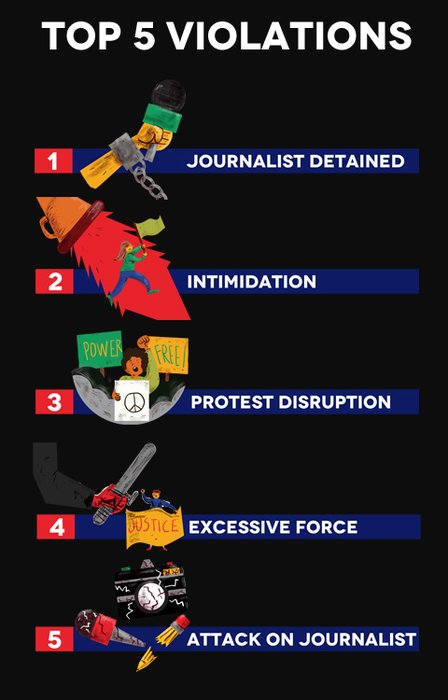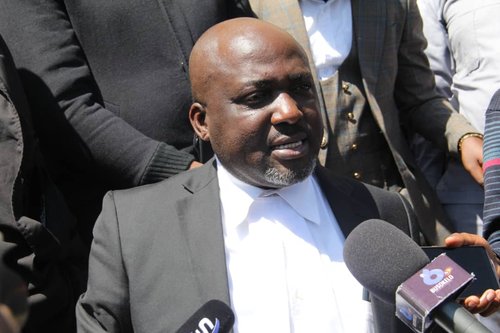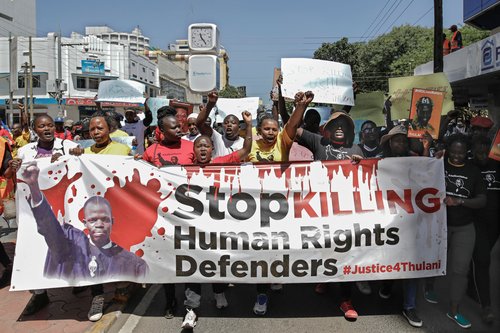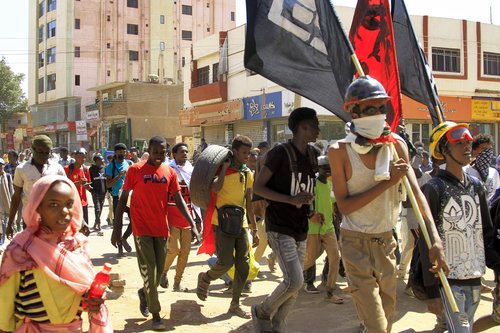Africa
Civic space conditions in Africa South of the Sahara remain highly restrictive: 45 out of 50 countries and territories are rated as obstructed, repressed, or closed. This means that the vast majority of people in Africa South of the Sahara face significant restrictions in exercising civic space freedoms. Civic space is open only in the island states of Cabo Verde and São Tomé e Príncipe, while Mauritius, Namibia and Seychelles have narrowed civic space.
Rating Overview
The civic space rating for Senegal has been downgraded to repressed as civic space violations have multiplied ahead of presidential elections, set to take place in February 2024. While President Macky Sall finally decided in July 2023 not to run for a third term, the judicial prosecution of Ousmane Sonko, perceived by the opposition to be politically motivated, has sparked protests and unrest, which authorities and security forces have severely repressed. In this context, civic space violations have intensified, including the use of excessive and lethal force against opposition protests, arbitrary arrests of journalists, the restriction of internet and social media access, including the suspension of TikTok, the suspension of media outlets and the dissolution of the opposition party PASTEF.
Benin’s civic space rating has been upgraded to obstructed as the severe civic space violations that led to its downgrade in May 2021, surrounding legislative and presidential elections, have not recurred. However, as the current rating suggests, HRDs in Benin noted that they continue to self-censor due to an atmosphere of fear of reprisals.
Lesotho has been upgraded from repressed to obstructed. A new government formed after the newly established Revolution for Prosperity party won competitive October 2022 parliamentary elections. It promises a more stable political environment with hope for an expansion of civic freedoms. However, police brutality, including during protests, remains an issue of grave concern. Other protest and media restrictions continue to be documented as key violations.
Our data shows an improvement in some indicators in Madagascar, accounting for the change in rating from repressed to obstructed. However, recent repression of opposition protests ahead of Madagascar’s November 2023 presidential elections highlights that civic space conditions remain challenging and volatile.
Regional trends
In West Africa, press freedom violations soared in the past year, including in countries ruled by military juntas. Following coups in Burkina Faso, Guinea and Mali, Niger experienced a military coup in July 2023, which was followed by repression of peaceful dissent, including the arrest of renowned activist and journalist Samira Sabou. Authorities in Senegal repressed opposition protests, arrested journalists, suspended media outlets and restricted internet and social media access in a context of heightened political tension ahead of the presidential elections. People in Nigeria continue to be faced with restrictions on their rights to protest and speak out, and the situation in Togo remains the same, with no progress made to improve civic space conditions.
In Central Africa, civic space remains affected by armed conflict, weak rule of law, impunity and entrenched authoritarian governments. In Gabon, controversial August 2023 general elections, surrounded by civic space violations, were followed by a military coup. In Cameroon, a crackdown on critical journalists was intensified through the killing of journalists, including popular radio journalist Arsène Salomon Mbani Zogo, also known as Martinez Zogo. A constitutional referendum in the Central African Republic, which removed the two-term limit for presidents, took place amid civic space violations, including threats, intimidation, harassment and public vilification.
The East and Horn of Africa reported the highest number of incidents involving the detention of journalists across the continent, with cases documented in Somalia in each country update during the year. A similar trend was observed in Somaliland, while in Ethiopia, journalists continued to face restrictions in the context of conflict because of their war-related reporting. Protest disruption remains a major cause for concern in Kenya, with incidents being reported in each of the country’s updates during the year. In Uganda, a new anti-LGBTQI+ law drew worldwide condemnation, while the government’s fulfilment of its threat to shut down operations of the office of the UN High Commission for Human Rights in the country raised concerns about the government’s commitment to human rights.
In Southern Africa, the plight of HRDs and whistleblowers remains a matter of grave concern as they face increasing threats, intimidation and killings because of their human rights work. In Eswatini, democracy activists continue to face systematic targeting for their work, expressed most viciously in the killing of prominent human rights lawyer Thulani Maseko, shot at his home in front of his wife and children in January 2023. In Lesotho and South Africa, the brutal cold-blooded murders of investigative journalist Ralikonelo Jokland and human rights activist Jomo Keromeng also added to a worrying trend in the region. Violence was often accompanied by threats of violence against HRDs and public vilification of CSOs by public figures, as documented in Eswatini and South Africa.
Civic Space Restrictions
In Africa South of the Sahara, the detention of journalists was the top civic space violation over the past year followed by intimidation, protest disruption, excessive use of force and attacks on journalists.
Detention of journalists
The most common violation, detention of journalists, was documented in at least 24 countries in Africa South of the Sahara. Journalists were also frequently physically attacked, the fifth most common civic space violation in the region, documented in at least 18 countries.
This is the fourth consecutive year that the detention of journalists has featured in the top three civic space violations in Africa South of the Sahara. Journalists have been detained due to their reporting on corruption and conflict, topics deemed to be sensitive or insulting to the authorities, or while reporting on protests or in the context of contested elections.
In some countries, including the DRC, Ethiopia, Nigeria, Somalia and Somaliland, the arrest of journalists remains a tactic commonly used by the authorities to silence and intimidate them. Ethiopia, Somalia and Somaliland particularly stand out under this theme, as journalists continue to operate in violent and volatile political environments. On 17 August 2023, police in Ethiopia arrested Yidnekachew Kebede, founder and editor of YouTube-based outlet Negari TV. A few days later when he appeared in court, police accused him of aiding ‘anti-peace elements’ and producing content ‘with the intent of provoking violence’. Prior to his arrest, Yidnekachew had criticised the state of emergency and denounced the detention of political activists and civilians on Facebook. A court released him on bail on 1 September 2023.
On 15 August 2023, the Maroodi Jeh court sentenced Somali-British journalist Busharo Ali Mohamed to a one-year prison sentence, despite the absence of substantial evidence of wrongdoing, for having actively covered Somaliland’s declining democracy and having referred to the current leader as ‘autocratic’. She was reportedly subjected to torture following her arrest on 15 May 2023.

Although the DRC’s new press law, adopted by the National Assembly in April 2023, is a step forward from the restrictive 1996 law, it still allows space for the authorities to criminalise journalism, as does the newly adopted Digital Code. On 8 September 2023 at Kinshasa N’djili airport, police officers detained renowned journalist Stanis Bujakera Tshiamala, deputy publication director of news site actualité.cd and correspondent for Jeune Afrique and Reuters, on accusations of ‘spreading false rumours’ and ‘disseminating false information’ under the Penal and Digital Codes. This came in response to an article published in Jeune Afrique, which did not name him as author, alleging that a report by the DRC’s National Intelligence Service claims that military intelligence officers were involved in the kidnapping and murder of opposition MP Chérubin Okende Senga, who was found dead on 13 July 2023. In Nigeria, journalists continue to be arrested and prosecuted, particularly for alleged cybercrimes and defamation.
Journalists have been targeted with arrests for reporting on corruption and topics considered sensitive or unfavourable to the authorities. In Senegal, authorities arrested and prosecuted several journalists for their reporting or editorials on the ongoing prosecution of Ousmane Sonko. On 29 July 2023, police arrested journalist Pape Alé Niang, who works for news site Dakar Matin, on accusations of having called for an insurrection in the comments he made during a live broadcast about Ousmane Sonko’s arrest. He was granted provisional release on 8 August 2023. This was the third time Niang had been arrested since November 2022. In South Sudan, officers of the National Security Service arrested six journalists from the South Sudan Broadcasting Corporation on 3 January 2023 for reportedly releasing a video of President Salva Kiir urinating on himself, which went viral on social media.
Journalists are often detained, albeit mostly briefly, while reporting on protests or public meetings, particularly those repressed and dispersed by security forces. In Zambia, police officers detained Millennium TV journalists Abel Musonda and Namo Phiri while covering an opposition protest in Lusaka. In Guinea, presidential guard members stationed at the Office of the Prime Minister violently detained Ibrahima Foulamory Bah, journalist for the independent online newspaper Courrier de Conakry, as he covered an anti-military junta protest on 9 May 2023. Security officers examined Bah’s phone and photographed him before releasing him. In Kenya, security officers briefly detained two journalists from media outlet Africa Uncensored while they covered an opposition protest over the rising cost of living on 27 March 2023. That day, several other journalists covering the protests in Nairobi and other parts of the country were subjected to harassment, violent attacks and confiscation of equipment.
Journalists were also detained in Angola, Botswana, Chad, The Gambia, Mozambique, Togo and Uganda.
Intimidation
Intimidation was the second most common civic space violation in Africa South of the Sahara documented in Monitor updates during the reporting period, observed in at least 30 countries.

Police and judicial authorities regularly use the summoning of journalists and HRDs for questioning as a tactic to discourage and intimidate critical voices. In Tanzania, police summoned lawyer Boniface Mwabukusi on 12 July 2023 for co-hosting a news conference in Dar es Salaam protesting at an agreement for the management of the country’s ports.
Threats, including death threats, and cyberbullying are used as tactics to try to silence dissenting voices. In Lesotho, journalist Ralikonelo Joki, known for his investigative reporting on subjects such as corruption and the government, was assassinated on 14 May 2023, and before then had received at least three death threats from different Facebook accounts in March and April 2023 as a result of his reporting.
In Burkina Faso, professional media organisations denounced the increasing number of journalists subjected to death threats in a context where some media outlets have been demonised and targeted as anti-patriots, terrorists, or working for terrorists. Following the publication of an article in the Libération newspaper alleging the involvement of military officers in the killing of children and adolescents on 27 March 2023, a well-organised smear campaign, using a bogus media network, targeted several Burkinabé journalists, including Hyacinthe Sanou and Lamine Traoré.
In Uganda, Sara Akello, an environmental HRD from Tapac sub-county, highlighted, in a petition submitted to Moroto district local government calling for action against widespread environmental degradation, that their activism to combat destructive mining activities had exposed them to threats.
In conflict areas, such as eastern DRC, armed groups have also intimidated journalists and media outlets. On 14 February 2023, the armed rebel group M23, which controls parts of Rutshuru Territory, North Kivu province, summoned the heads of broadcast media operating in the area, accused them of ‘inciting hatred’ and ordered them to change their editorial line. M23 ordered the media outlets to broadcast a weekly programme, led by an M23 member, and prohibited the retransmission of a popular radio station and programme produced in Goma by journalists who have fled the area. Meanwhile, the national media regulator, the High Council for Broadcasting and Communication, threatened media outlets with legal proceedings for complying with M23 orders.
There have been several cases of public officials or law enforcement officials publicly threatening journalists and HRDs with arrests or worse. On 21 January 2023, King Mswati of Eswatini warned democracy activists in the country ‘not to shed tears’ about ‘mercenaries killing them’, just hours before Thulani Maseko was assassinated. This was not the first time King Mswati had issued a stern warning against dissenting voices. In South Africa, Gwede Mantashe, Minister of Mineral Resources and Energy, repeatedly used public platforms to attack and vilify CSOs and their funders, most recently during an oil and gas conference. Mantashe accused CSOs of being CIA agents with negative agendas to block development in South Africa, in reaction to a High Court ruling that set aside Shell’s coastal seismic surveys following a challenge initiated by CSOs.

Media outlets and HRDs had their offices or houses broken into. On 17 July 2023, unidentified people stole equipment from the offices of media outlet Ethiopia Insider in Addis Ababa, Ethiopia. Allegations suggest that the perpetrators selectively took equipment to inflict damage on the company’s video reporting capabilities, a suspicion intensified by the significant pressure the media outlet had previously faced due to its reporting. On 28 March 2023, armed intruders broke into the home of HRD Dismas Kitenge, president of the CSO Lotus Group, in Kisangani, the DRC. The intruders searched the house for Kitenge, stole valuables and fired into a field in front of the house, threatening to return when they could not find Kitenge. He was also subjected to anonymous death threats and attacks following an interview he gave to the media on 25 March 2023, in which he commented on the appointment of a new government.
Protest disruption and use of excessive force
The third most common civic space violation in Africa South of the Sahara was protest disruption. As in previous years, many protests have taken place in Africa on a wide range of topics, including the high cost of living, the lack of basic service delivery, demands for a return to civilian rule and elections, among others. Disruption of protests was documented in at least 22 countries, with the use of excessive force in at least 20.
People in several countries held protests against the increasing cost of living and social inequality, including in Ghana and Liberia. In Kenya, several of the protests were disrupted. On 20 March 2023, during the first of a weekly series of opposition protests against skyrocketing costs of living and allegedly fraudulent elections held in August 2022, police fired teargas and arrested dozens of people, including two opposition leaders. In Kisumu, police used live ammunition to disperse protesters, killing university student William Mayange. On 30 April 2023, the Nairobi Regional Police Commander announced a ban on these protests, while President William Ruto also publicly said the protests were illegal.

Pro-democracy protests were disrupted in Guinea and Sudan , both countries ruled by military juntas. In Sudan, where pro-democracy, anti-coup protests continued until fighting between the Sudanese Armed Forces (SAF) and the paramilitary Rapid Support Forces (RSF) erupted in April 2023 , security forces used excessive force and arrests to disperse protests. On 14 March 2023, police arrested 11 peaceful protesters in Khartoum during an anti-coup protest and charged them with disturbing the peace under the Penal Code. On 16 and 17 February 2023, the military was deployed in Conakry, Guinea, to assist police with quelling protests demanding a return to civilian rule. Security forces used teargas, gunshots were heard and clashes occurred, with at least two people reportedly killed.
Election-related and opposition protests were also disrupted by security forces, often with the use of excessive force. Ahead of Madagascar’s November 2023 presidential elections, security forces fired teargas to disperse an opposition protest in Antananarivo against what protesters called an ‘institutional coup’, injuring several people, including a presidential candidate. Previously in March 2023, the Minister of Interior had announced a ban on demonstrations in open places. In Senegal, security forces have since March 2021 cracked down on several opposition protests against the ongoing prosecution of Ousmane Sonko ahead of February 2024 presidential elections. Dozens of people were killed in protests and clashes on 1 and 2 June 2023 in Dakar and Zinguinchor following Sonko’s conviction, in absentia, for ‘corrupting youth’. In an attempt to quell the protests, the authorities in Senegal restricted mobile internet and social media access.
In eastern DRC, people continued to protest against the insecurity and abuses caused by the armed conflict and to demand the departure of the UN peacekeeping force, the UN Organization Stabilization Mission in the DRC, with protests often violently disrupted, including with live ammunition. On 30 August 2023, over 50 people were shot and killed during a protest in Goma, North Kivu province, when the military was deployed to disperse the protests, banned by local authorities. The North Kivu military court convicted four military officers for the killings.
Environmental and women’s rights protests have also been disrupted. On 23 May 2023, the Lesotho Defence Force forcefully confiscated advocacy placards during a protest against the negative effects of the construction of the Lesotho Highlands Water Project, with protesters concerned about the impacts on the community and drinking water quality. In Uganda, authorities arrested 11 female lawmakers as they headed to the Ministry of Internal Affairs to protest against women’s rights violations.

Media freedom in Africa on a downward spiral
The past year has seen increasing attacks on press freedom in Africa, through the detention and prosecution of journalists, intimidation, harassment of and threats against journalists, acts of censorship such as the suspension of media outlets, censorship of LGBTQI+ and protest-related content, attacks against journalists and disruption of internet and social media access. Over half of civic space violations the CIVICUS Monitor documented in Africa South of the Sahara were violations of freedom of expression.
Media freedom violations in post-coup countries, particularly in Burkina Faso, Guinea, Mali and Niger, have soared as military juntas and their supporters have shown intolerance of criticism and peaceful dissent. French broadcasters Radio France Internationale and France 24 were indefinitely suspended in Burkina Faso while the broadcasters’ signal was blocked in Niger following the military coup in July 2023. The two broadcasters had already been suspended in Mali in 2022. On 23 June 2023, Burkina Faso’s national media regulator, the Superior Council of Communication, suspended French media outlet La Chaîne Info for a period of three months on accusations of ‘false information’ for statements made on the deadly violence and attacks in the country during a broadcast. Mali’s national media regulator suspended TV channel Joliba TV News and its Facebook page for a period of two months on 3 November 2022 for ‘serious and repeated breaches’. In Guinea, in the context of protests against the military junta, military transitional authorities have applied censorship, including intimidation, confiscation of media equipment, restrictions to internet and social media access, public threats to close media outlets and the interruption and jamming of signals of some radio stations. Some news sites also became inaccessible for users in Guinea. In Niger, renowned blogger and journalist Samira Sabou was arrested and charged with ‘production and dissemination of data likely to disturb public order’. Journalists in Burkina Faso, Guinea, Mali and Niger have been subjected to threats, intimidation, physical attacks and smear campaigns.
In several countries, national media regulators, or in some cases local authorities, have suspended media outlets, including in Cameroon, Chad, the DRC, Ethiopia, Gabon, Guinea, Nigeria, Senegal and Sierra Leone. In Nigeria, telecommunications engineers, contracted by local authorities in Rivers State, dismantled the transmitter mast and demolished the transmitter complex of Radio Raypower FM and Africa Independent Television in Port Harcourt on 3 September 2023 over a land dispute, effectively shutting down the media outlets. In Senegal, Walf TV has been suspended twice, in February and June 2023, over its coverage of anti-government protests, accused of ‘dissemination of images of violence exposing minors, accompanied by subversive and hateful remarks undermining the stability of the State’. In another act of censorship, the authorities have denied press accreditation to or have expelled foreign correspondents, including in Burkina Faso and Gabon.
The safety of journalists remains a concern in many countries in Africa South of the Sahara. The CIVICUS Monitor documented physical attacks against journalists in at least 18 countries. In the DRC, Ghana and Nigeria, journalists continue to be subjected to assaults from state and non-state sources, such as supporters of political parties and armed groups. Journalists were killed or died in mysterious circumstances in Cameroon, Lesotho and Rwanda. A concerning development in Kenya, with potential repercussions for the safety of journalists, is the practice of police officers impersonating journalists during protests and in courtrooms, a trend condemned by the Media Council of Kenya in July 2023. In Ethiopia, LGBTQI+ journalists are subjected to intimidation, invasion of private lives and the threat of torture. An anonymous journalist explained that engaging in any form of reporting on human rights could result in journalists being linked with LGBTQI+ issues, leading to self-censorship.
As in previous years, the authorities have imposed internet restrictions, particularly during anti-government protests or in the context of elections, including in Guinea, Gabon, Senegal and Tanzania.
| COUNTRY | SCORES 2023 | 2023 | 2022 | 2021 | 2020 | 2019 | 2018 |
| ANGOLA | 35 | ||||||
| BENIN | 47 | ||||||
| BOTSWANA | 60 | ||||||
| BURKINA FASO | 46 | ||||||
| BURUNDI | 28 | ||||||
| CAMEROON | 26 | ||||||
| CAPE VERDE | 88 | ||||||
| CENTRAL AFRICAN REPUBLIC | 31 | ||||||
| CHAD | 25 | ||||||
| COMOROS | 46 | ||||||
| CÔTE D'IVOIRE | 54 | ||||||
| DEMOCRATIC REPUBLIC OF THE CONGO | 33 | ||||||
| DJIBOUTI | 20 | ||||||
| EQUATORIAL GUINEA | 19 | ||||||
| ERITREA | 3 | ||||||
| ESWATINI | 24 | ||||||
| ETHIOPIA | 31 | ||||||
| GABON | 40 | ||||||
| GAMBIA | 55 | ||||||
| GHANA | 55 | ||||||
| GUINEA | 26 | ||||||
| GUINEA BISSAU | 49 | ||||||
| KENYA | 50 | ||||||
| LESOTHO | 52 | ||||||
| LIBERIA | 49 | ||||||
| MADAGASCAR | 47 | ||||||
| MALAWI | 60 | ||||||
| MALI | 32 | ||||||
| MAURITANIA | 39 | ||||||
| MAURITIUS | 77 | ||||||
| MOZAMBIQUE | 39 | ||||||
| NAMIBIA | 71 | ||||||
| NIGER | 35 | ||||||
| NIGERIA | 32 | ||||||
| REPUBLIC OF THE CONGO | 33 | ||||||
| RWANDA | 23 | ||||||
| SAO TOME AND PRINCIPE | 82 | ||||||
| SENEGAL | 31 | ||||||
| SEYCHELLES | 76 | ||||||
| SIERRA LEONE | 47 | ||||||
| SOMALIA | 29 | ||||||
| SOMALILAND | 35 | ||||||
| SOUTH AFRICA | 55 | ||||||
| SOUTH SUDAN | 25 | ||||||
| SUDAN | 21 | ||||||
| TANZANIA | 32 | ||||||
| TOGO | 39 | ||||||
| UGANDA | 30 | ||||||
| ZAMBIA | 53 | ||||||
| ZIMBABWE | 30 |
*Covering countries south of the Sahara.



